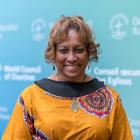Sometime between 486 and 465 BCE, the Bible tells us, a disagreement arose between a husband and wife on the way the wife should be presented at a banquet. The disagreement resulted in the wife losing her title of queen. The wife’s name was Queen Vashti, and her husband was King Ahasuerus of Persia. King Ahasuerus decided to find another wife. Esther, a disguised Israelite teenager, was chosen as the new queen.
Queen Esther, like Queen Vashti before her, also ended up disagreeing with her husband. Esther’s objection was the unjust laws and customs directed at the Israelite people. She also risked losing her crown and being sentenced to death. Both queens had felt that it was their time to reject unjust, discriminatory laws and customs based on gender, racial-ethnic identity, and class.
We are called to remember women like these and to advance a vision of justice for all people. This year is an opportune time for selecting leadership for and by all people in many elections being held throughout the international community.
The reigns of Esther and Vashti saw that “Israelite Lives mattered” and “Women’s Lives mattered” despite their marginal status within the dominant rule of the Persian Empire. In similar fashion, marginalized and minority communities matter throughout the world as do the majority.
Queens Vashti and Esther were change agents of the systems and structures of the Persian kingdom for all the people and not the privileged few when they took their stances. They promoted dignity and challenged the unjust treatment of the Israelite people while the dominant culture benefitted from their oppression.
Today many of us may benefit from the globalized economy but still many are left behind because of hunger and poverty, just like in the days of Queens Vashti and Esther. Women are disproportionately affected by this globally.
We, like Queens Vashti and Esther, are called to stand up for all and not just the few. This means changing public policies so all are fed and live lives of dignity.
This year we have a responsibility to ensure that the right leaders – those who will stand up for all people - are elected wherever we live. Now is the time to determine who these persons are if you are holding elections this year or to hold accountable those persons who have been elected.
The World Council of Churches' Pan African Women’s Ecumenical Empowerment Network (PAWEEN), Bread for the World and Howard University Office of the Dean of the Chapel will host an international consultation with pan-African women of faith that will address these issues June 9 to 11, 2016, in Washington, D.C. Please contact us at [email protected] for more information.







